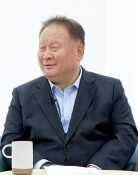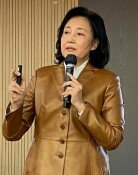Hyundai Motor chairman’s another unexpected winning move
Hyundai Motor chairman’s another unexpected winning move
Posted April. 02, 2018 07:45,
Updated April. 02, 2018 07:45
Hyundai Motor Group Chairman Chung Mong-koo has made multiple winning moves to overcome crises whenever the group stands at a crossroads. Just to name a few, Hyundai under the leadership of Chung, paved the way to become a major global automaker in 1998 by acquiring Kia Motors, which was under receivership back then, against strong opposition from in and outside of his company. It was the following year when Hyundai dramatically changed public awareness toward its quality and performance by introducing an exceptionally long 10-year and 100,000-mile warranty, which was considered unconventional in the U.S car market.
Chung’s decisive and innovative management is again evidenced by its plans to improve governance structure announced by Hyundai Motor Group on Wednesday. Market watchers were not surprised that the group came up with a plan to overhaul tis circular shareholding among Hyundai Mobis, Hyundai Motor, Kia Motors, and Hyundai Mobis. The move was pretty expected as South Korea’s Fair Trade Commission Chief Kim Sang-jo had been putting pressure on the group to improve corporate governance, pointing at the group’s complex ownership structure that gives too much power to Hyundai’s controlling Chung family. However, management’s decision to form a large business group instead of adopting a holding company structure came as a surprise to many.
There seem to be two major reasons that Chung did not choose to have a holding company that would save at least 1 trillion won in transfer tax. Firstly, current anti-trust rules prohibit a holding company from owning any financial affiliates, which means, under a holding company structure, the group will have to sell its financial affiliate Hyundai Capital that deals with lease purchase financing business. Secondly, affiliates in a holding company structure are not allowed to engage in mergers and acquisitions. This would lead to the automaker’s losing its competitiveness in the global car market where players are fiercely competing through active merger and acquisitions.
A holding company should be viewed as neither the only solution for transparent governance structure nor the system that guarantees better business performance. Lotte Group, which formed a holding company in October last year, is still having difficulties selling its eight financial affiliates including Lotte Card. Selling Lotte Card is bound to have a consequential impact on its distribution business. Unlike Japan where manufacturing companies including Sony are allowed to have banking or insurance institutions as an intermediary financial holding company under the umbrella of a holding company, South Korean companies have no room for flexibility. From the perspective of a company’s competitiveness, Chung has made a wise decision in the company’s business restructuring.
It is worth noting that Hyundai appears to be preparing a smooth transition in the control of the group from Chairman Chung to his son and vice chairman, Chung Eui-sun. In the group’s business restructuring, the younger Chung has become a major shareholder of Hyundai Mobis for the first time, which will help him to have tighter control of group affiliates. So far, the younger Chung has been so cautious about being hailed as an apparent heir that he was, to some extent, underestimated to take over the family-run company from his father, by market insiders. Therefore, the increased role of Vice Chairman Chung has significance for dismissing market jitters as well as strengthening the group’s business structure.
In recent years, Hyundai and Kia cars are well received by consumers. They are now said to be on a par with luxury brands such as Mercedes and Lexus, in terms of quality and comfort, but still have a long way to go to give a feeling of satisfaction, pride and achievement that luxury cars provide to drivers. The younger generation who places more value on brand reputation, design, and what others think of themselves and their vehicles, would take these factors into account when buying a car. Hyundai Motor Group needs to combine the younger Chung’s strategic and business savvy and his father’s commitment to quality, to keep up with the times and attract more younger consumers.







